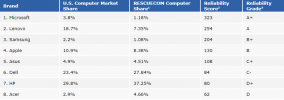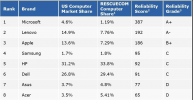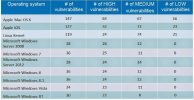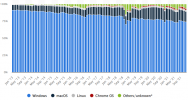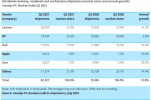The butterfly keyboard is really problematic sure, but you have a 4 year quality program that offers you multiple replacements in case the issue persists, I can't recall other brands having recall programs for they're laptops
Ya, but you're missing the point. You are stating it as if "Apple Cares" - they only started that program because a court ordered them to after they stiffed over 15,000+ of their customers
for years as they denied there was an issue at all... and made people pay upwards of $400-600 for a keyboard replacement prior to being sued.
Apple knew they were selling, in the case of the displays and keyboards, defective products based on their own data -
a court found. They refused to fess-up for years, so let's not act like they did this to be "a good company".
Perhaps the reason we don't see many other large-scale recalls for other computers is because they don't have wide spread defect problems with their keyboards and screen cables?
Apple denies there is ever an issue, when there is... they still do that. They only relent when they face court orders. Their security is largely "security by obfuscation" - which isn't security at all.... and Apple will deny there is a security vulnerability and will disregard any patches simply to save face and not have negative articles and press pointing to "patches" that fix "flaws"... leaving customers vulnerable in the mean time.
As far as exploits go, there are a ton of zero-click exploits for Metasploit for their phones and computers that Apple have not even acknowledged... even though anyone can grab Metasploit and see them for themselves - Apple can't? Or rather... they don't want to acknowledge that there is an issue, hence, stick head in sand? At least MS and others update their stuff regularly to be secure (try to anyways), regardless of their "image". Windows certainly has it's own issues, for sure.
Correct, but the MacBook Pro Late 2007 came with 10.4 and supports 10.11, so still usable, with restrictions of course, and has 7 years of updates, the early 2007 models were the ones that only updated to 10.7.5.
Well, we didn't make the distinction before, and while you can certainly pick the MacBook Pro Late 2007 (Which is only 2 months of 2007) - that leaves pretty much the entirety of the rest of their 2007 lineup in the trash bin. Macbook, Macbook Air, Mac Mini and Mac Pro - no good. That leaves 2 months of Macbook Pro's and ~4 months of specific configurations of iMac's.
If you want to go a little bit further there's a possibility to install later versions of macOS using patched system, again not the best solution but a doable one, just like installing windows 10 on a laptop with 10+ years.
And if you want to "hack" something onto old hardware,
Windows 11 is running on a 15 year old single-core Pentium 4 - so does that mean Windows wins in the dick-measuring contest, then?
All of the above, are NOT at the same price range of the MacBook Air M1, the price point in € is 1159€ and 999$, the ones you've mencioned in € are ALL at 1849€ and 1899€, (not sure the price in US dollars) so NOT exactly the same thing.
Well, the metrics for comparison were battery life and weight, not cost. Why does a Windows machine that has MUCH better battery life (if that's what you cared about) at roughly the same weight as the Mac... with more features (Touchscreen, better RAM and graphics specs, etc) have to be the same cost? Arguably you are getting "more" with the Windows PC - why should we expect it to be less money or the same money, than the lesser computer? But let's back up a sec.
You asked if any Windowz computer could beat Apple's amazing 10hr battery life... so let's match apples to apples (no pun intended). 10hr battery life just isn't that impressive, really:
Asus ExpertBook B9450 - 16hrs 29mins - $1600
LG Gram 14 from 2020 - 16hrs 3mins - $1340
LG Gram 17 from 2020 - 16hrs 17mins - $1579
Samsung Notebook 9 Pro - 12hrs 30mins - $900
Dell XPS 13 9370 from 2020 - 11hrs 26mins - $566
Lenovo YOGA C740 - 11hrs 12mins - $669
.... I'll stop there, without listing the other 20-30 10hr+ laptops.
Ok but do you have a machine with 7 years that supports windows 11 (without replacing hardware? RAM and SSD excluded), Apple gives 6/7 years of macOS updates and continues to release security updates to this day to older macOS versions.
I feel you're conflating two different things - "Support" and "Newest Operating System" and the interaction between "hardware generations" and "technical limitations".
In your comparison I quoted above, you unfairly refer to "Windows 11" for Microsoft and "6/7 years of MacOS updates" for Apple
The comparison should be "Supported Windows OS's" vs "Supported OSX's" - An Apple computer is obsolete between 6-8 years depending on models and year (The 8 year figure included only for some outliers) - so let's say an avg of 7 years.
Microsoft OS's are supported for 10 years or more (up to 15 in some cases).
It matters not, that you don't have the "Latest" OS for Windows, your computer is fully functional and updates and features are still being added to past Windows versions. In the case of the mac, on avg, after 7 years.. your mac will become severely functionally limited or unusable. There's really no way around it, Microsoft provides better support and longevity for their OS's, than Apple.
Regardless, it's a moot point in most cases since almost nobody holds onto the same laptop as a daily device,
as a serious user, past 7-10 years anyway - I would say.
This point is the US market? cannot speak here, won't refute this but I do not live there and cannot claim other thing than the ones I can

My personal experience with Apple is a very positive one, I use many Apple products and I cannot think of using other OS's in my day to day life.
And many have a positive experience with their Apple computers. So do many with their Windows Computers. Like I have stated before.. the last issue I had with a Windows computer of my own (No garbage hardware) - was pre-Windows 7 during the XP days... so for the past 17+ years I've had ZERO issues with my personal or Business Windows computers (over 20 during that time, 3 person household). Is that not reliability and longevity?
"Apple people" think they're the only one's benefiting from "technology". That's right,
technology. Apple doesn't make 95% of their computers internals... their internals are drawn up from plans from Wistron and Foxconn, AMD and Intel, Realtek, Qualcomm, Infinion and the like. They just build a case around it and slap all the pieces together. Every time you see a new camera, or sensor or new hardware feature - it's largely because somebody else made it and that "product" is available for implementation into consumer goods.
Their M1 chip is kinda a scam. They claim "they made it", but they only kinda made it. See,
I can go make an ARM processor too.. each processor, memory section, instruction sets are all offered as "Blocks" that you can pick and drop into CAD to fit your needs. That's all that Apple did (for the most part) - they purchased the designs from ARM, plopped X amount of Cores and X amount of Cache, etc.. They didn't design it, ARM did - Apple simply ordered a custom ARM chip based on their in-house preferences.
All that to say, Apple's "reliability" as far as hardware goes - from an EE (Electrical Engineering) aspect.. is just as good as most other competing products... sometimes worse, sometimes better - but rarely by leaps and bounds. Their motherboards are not special. The capacitors they use are not special. The components on the board are largely the exact same components as everyone else. I would argue, in many respect's, Apple's choices towards engineering are stupid and self-serving at the expense of stupid **** nobody is asking for... but that's for another conversation.
When Apple actually designs it's own stuff (Like the T2 chip) - It's been hit or miss. In the case of the T2 chip, that's been having an abnormal amount of failures, requiring MB replacement and causing full data loss (locally on the mac) and has an unfixable flaw that makes it fully vulnerable:
TL;DR: recent Macs (2018-2020, T2 chip) are no longer safe to use if left alone and physical access was possible, even if you had them powered down.
• The root of trust on macOS is inherently broken
• [An attacker] can bruteforce your FileVault2 volume password
• [An attacker] can alter your macOS installation [i.e. install malware]
• [An attacker] can load arbitrary kernel extensions
Apple's T2 chip is supposed to make Macs more secure, but it may do more harm than good. Here's everything you need to know to protect your Mac from exploitation.

www.intego.com


